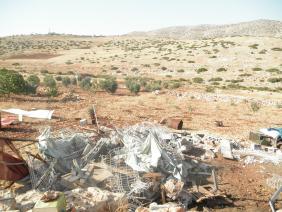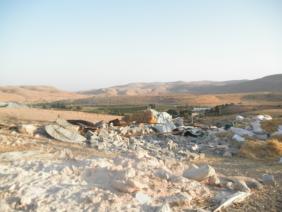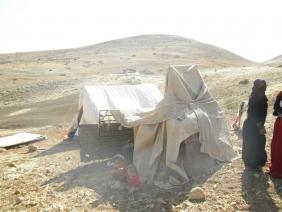Hell is here!! in the palestinian Jordan Valley !
 Hell is here! The air is on fire (48 degrees centigrade blew my mind), a suitable background for the hell that is Occupation. Unparalleled evil everywhere we went. hell that is wholly man-made, the deeds of men, Jews, occupiers, cruel. Inconceivable. Unlimited. Without a drop of compassion. It is the sheer cruelty of trampling the lives of innocents who lead their quiet, miserable lives, growing their miserable flocks under conditions that - even without military occupation - one can hardly conceive to be survivable. And then the cruel occupier pounces on them with
Hell is here! The air is on fire (48 degrees centigrade blew my mind), a suitable background for the hell that is Occupation. Unparalleled evil everywhere we went. hell that is wholly man-made, the deeds of men, Jews, occupiers, cruel. Inconceivable. Unlimited. Without a drop of compassion. It is the sheer cruelty of trampling the lives of innocents who lead their quiet, miserable lives, growing their miserable flocks under conditions that - even without military occupation - one can hardly conceive to be survivable. And then the cruel occupier pounces on them with  all his might, to devastate, destroy and confiscate the very last drops of water, steal frightfully famished cows so their owners have to pay thousands of shekels to get them back! Whom are the occupiers robbing? On whom are they imposing impossible fines? Those who have not even enough to survive, who live on rice and lentils, and at best – some humus. This occupier does not allow the paving of a road so that Hadidiya children could be driven to school, he does not allow old man Zob’ah to fill the ditch in the only access track to his home on the top of the hill, so that an ambulance could drive him to hospital.
all his might, to devastate, destroy and confiscate the very last drops of water, steal frightfully famished cows so their owners have to pay thousands of shekels to get them back! Whom are the occupiers robbing? On whom are they imposing impossible fines? Those who have not even enough to survive, who live on rice and lentils, and at best – some humus. This occupier does not allow the paving of a road so that Hadidiya children could be driven to school, he does not allow old man Zob’ah to fill the ditch in the only access track to his home on the top of the hill, so that an ambulance could drive him to hospital.
I cannot remember a time, in all my years as a Machsomwatch volunteer, when I returned from the Occupied Territories consumed by  such pain and anger. Such shame. Such revulsion at my own country, at “our sons” the soldiers who follow such orders and even have a good night’s sleep – they really couldn’t care less. No one could actually care less! There’s not a drop of compassion, anywhere!
such pain and anger. Such shame. Such revulsion at my own country, at “our sons” the soldiers who follow such orders and even have a good night’s sleep – they really couldn’t care less. No one could actually care less! There’s not a drop of compassion, anywhere!
I know – this is ethnic cleansing, the wish to get rid of the Palestinians, especially the most weakened ones, the “transparent” ones, in order to finally annex the Palestinian Jordan Valley. We know all the reasons, and still – are there no red lines? I know that the lust for more and more land drives the State of Israel out of its mind. But how can children, old people, sheep be left in the sun at 48 degrees centigrade? How can their water tankers possibly be confiscated? How can humans be denied access to their homes, children denied access to school? Where is the Fourth Geneva Convention? Where is the UN’s Universal Declaration of Human Rights?
Saddest of all was to realize that it works. At Khalat Makhoul – a year and a half ago dwellings were demolished there for the first time. Eleven families had been living there. Now only five families are left, and among the tents empty yellow spaces are seen where, until recently, other families had lived until they desperately sold their flock and moved to Tamoun village (in the hills of the West Bank, to the west of the Jordan Valley), to be jobless there, for there is no employment in Tamoun.
We visited Mohammad Faqir – whose tent and sheep pens the Civil Administration demolished on August 5, 2015. With your donations we bought him black shade sheets. Mohammad receives us with an empty gaze, staring into space. We explain to him who we are. His gaze remains empty. A young man, hardly more than a boy, his thin beard has only now begun to grow, and he seems in utter shock. As if he cannot understand what has happened to him, and how he is even to begin coping with it. The shade sheets are thrown to the side, and to our question why he does not hang them up over the sheep wilting in the sun, he shrugs and whispers, “tonight”. But he has had these sheets for some days now. Apparently he is simply unable to deal with this. His wife and mother join us with the two small children – two and one-year old. They have managed to put together a miserable-looking tent out of rags, and the Red Cross too has donated a small tent. That’s all they have.
demolished on August 5, 2015. With your donations we bought him black shade sheets. Mohammad receives us with an empty gaze, staring into space. We explain to him who we are. His gaze remains empty. A young man, hardly more than a boy, his thin beard has only now begun to grow, and he seems in utter shock. As if he cannot understand what has happened to him, and how he is even to begin coping with it. The shade sheets are thrown to the side, and to our question why he does not hang them up over the sheep wilting in the sun, he shrugs and whispers, “tonight”. But he has had these sheets for some days now. Apparently he is simply unable to deal with this. His wife and mother join us with the two small children – two and one-year old. They have managed to put together a miserable-looking tent out of rags, and the Red Cross too has donated a small tent. That’s all they have.
We crossed Tyassir Checkpoint which is open to traffic. Across the road from the demolished entrance to the village of Akaba (the army has ruined the access road to the village a year and a half ago) there is a neat encampment with small olive and fig tree groves, quite well-tended. Here, too, the army has demolished the sheep pen on August 5, 2015, but the owner has already put parts of it back together. Faisal Musa’ed is enthralled as we explain to him who we are, and that we’re Israelis, Jews. “Thank you, thank you…” he murmurs excitedly and we don’t know where to bury ourselves. The land is his, registered in his name. But he is forbidden to build. Anything. Even a sheep pen. Even his lovely fruit tree patch is forbidden, but for the time being it is still there. Soldiers constantly carry out maneuvers next to his home. Sometimes they order him and his family to evacuate, sometimes they don’t. They come at night and fire over the children’s heads. “How can one live like this?” he asks. They shoot within his own private area. A year ago the army came in and held exercises there, the tanks took down five olive trees in order to cross the olive grove right down the middle. While all around vast areas lie empty, arid. But the army has to train right inside Faisal‘s olive grove. A year ago three of his cows were confiscated and he had to pay 3000 shekels to get them back. 1000 shekels a head.
The spot is high and enjoys a light breeze, and this as well as the impressive landscape and the figs he pampers us with lets us relax a bit. Then I notice three of his little children sitting nearby and giving us hating looks. We are the representatives of the bulldozer and the tank. Of the Civil Administration’s white jeep that always designates imminent catastrophe. They remind me who is who here, in spite of all our good intentions.
That very day the army demolished a stone house and 5 sheep pens at the entrance to Akaba village (see Tzviya Shapira’s report). But we did not manage to get there. The army also evacuated a tractor today, at 14:30, which serves to transport a water tanker from a farmer at En Ibzik near Tyassir.
Homssa – the house on the hill above Hamra Checkpoint, home of Zob’ah Bisharat
Seven of Zob’ah’s sons have moved out to other localities because they are not allowed to construct their own homes on their father’s land (privately owned, registered). Only Mahmoud is left and two disabled daughters. Mahmoud built himself a room next to his father’s home at the tip of the hill, but last winter the roof was blown off, so he decided to build a small one-room structure, a bit more protected from the elements further in, still on his father’s land. On August 8, 2015 came agents of the Civil Administration and required him to remove his belongings for they would come to demolish it in 10-days’ time. They did not wait 10 days. Two days later came two bulldozers and six jeeps and demolished the home as well as 3 sheep pens. Now Mahmoud sleeps in his parents’ single room along with them, his sisters, his wife and two daughters.
It was a hard uphill drive to Zob’ah’s house. Harsh winter rains had plowed a deep ditch in the middle of the dirt road along at least 100 meters, at some points 40-50 cm deep. When we got to this ditch in our car we considered going back down but the track is narrow and makes it impossible to turn around and back up. We made it as I trembled in fear, the tires moving at the edge of the cliff. Mahoud told us how his 75-year old father had to be urgently hospitalized (he still is in the hospital at present) and the ambulance driver was afraid to risk driving up to the house. The father had to be taken downhill with the tractor to the ambulance that waited below. Why don’t they fill up the ditch? Forbidden. A track is considered infrastructure, and in Area C infrastructures must not be changed. Not even fixing an existing track that has been ruined by the elements. One needs a permit, and such permits are just not issued.
Mahmoud tells us that the spring En Al Shibli near Nablus – where Palestinians purchase their water because Israel denies them using the local water – has been drying up in spite of last winter’s generous rainfall. The great heat and increased consumption has dried it up, and so the price of water has risen by 25% in the middle of this summer.
Hamra Checkpoint
The northern lane is still closed so the Palestinians from both directions are forced to use a single lane, alternating crossing by turns (once those coming from the west, from Nablus, and once from the Jordan Valley). We did not see long waiting lines, for the extreme heat conditions must keep many vehicles off the road – numerous Palestinian cars are not air-conditioned.
Finally, an anecdote: We met a Palestinian, one of those whose homes the army has demolished. He handed me the wallet of a soldier containing the soldier’s military ID, a prayer book and personal letters, which the soldier must have dropped while demolishing the man’s home. This honest person asked me to turn the wallet in, give it back. He is afraid to do it himself. Rightly so. Who would believe a Palestinian?
The day after our visit, on August 17, 2015, according to the report by Amira Hass in Ha’aretz of August 19, 2015, Israel demolished dozens of homes near Ma’ale Adumim settlement and in Fasa’il – 127 persons, among them 80 children, remained homeless. Along with their livestock they have remained without any shelter from the sweltering heat.
